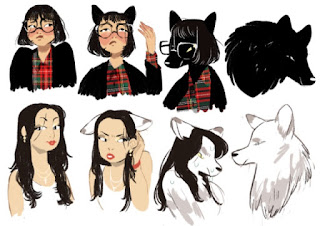An RPG about social intrigue or obscure lore
In Familiar, I've got four attributes... combat, knowledge, influence, and magic. The game is all about mystical familiars, so it's natural that magic gets far more detail than the other three attributes. But when I woke up this morning, the realisation hit me that it could be just as easy to focus on any of the other three attributes. A game expanding the options for the combat attribute would be par for the course with most mainstream RPGs. But I think it would actually be more interesting to develop separate games that really delve into the worlds of the influence attribute (through social intrigue, political manuevering, mass media, and cultural etiquette) or the knowledge attribute (through investigation, hidden lore, arcane science, and theoretical knowledge. Such games would be complimentary, but since Familiars are creatures of magic, the other attributes don't really form the focus of their adventures. The all-rounders would probably be regular people who can gai...




